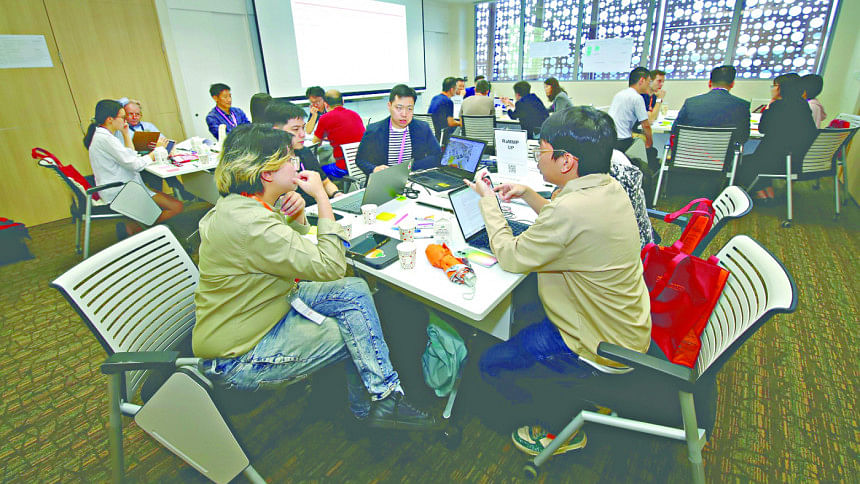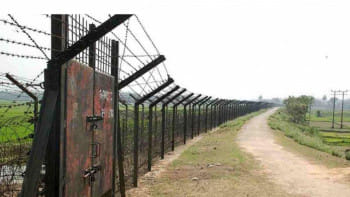Innovating for a healthier, sustainable future

The inaugural Asia-Pacific Global Health Innovation Hackathon 2025 took place from 17-18 January 2025 and brought together 16 teams from 13 Asia-Pacific markets to address the urgent intersection of health challenges and climate change. Jointly hosted by the SingHealth Duke-NUS Academic Medicine Innovation Institute, SingHealth Duke-NUS Global Health Institute, and the SingHealth International Collaboration Office, this unique regional event aimed to develop transformative, scalable solutions for some of the region's most pressing health issues.
Climate change significantly impacts human health through environmental changes such as deteriorating air quality, altered disease vector distribution, extreme weather events, and disruptions to food systems. These changes exacerbate respiratory, cardiovascular, and waterborne diseases, increase the risk of undernutrition, and affect mental health. Addressing these challenges requires comprehensive climate mitigation and adaptation strategies.

The hackathon brought together teams of three to four participants, including innovators, technical experts, researchers, and healthcare professionals from Bangladesh, China, India, Indonesia, Malaysia, Mongolia, Nepal, Singapore, Sri Lanka, Taiwan, Thailand, the Philippines, and Vietnam. Participants developed data-driven solutions to combat climate-related health challenges, receiving expert guidance from mentors from Duke-NUS Medical School, the National Environment Agency, WHO, and other organisations.
The event concluded on 18 January 2025 with a pitch session, where teams presented their ideas to a judging panel from the International Finance Corporation, PATH, Singapore Deep-Tech Alliance, and the WHO. Three winning teams were awarded a six-month incubation programme to further develop their concepts into fundable solutions. The programme included mentorship from experts in health, sustainability, and innovation, with a two-week in-person incubation session in Singapore and ongoing virtual support.
Professor Ng Wai Hoe, Group CEO of SingHealth, emphasised the healthcare implications of climate change, particularly for Singapore, which is vulnerable to rising temperatures and evolving infectious disease patterns. The hackathon, he stated, is a platform for innovation at the intersection of climate resilience and medicine, with the goal of creating sustainable healthcare solutions adaptable to the region's needs.
Ms Lee Chen Ee, Group Director of SingHealth Division of Innovation & Transformation and Co-Chair of the SingHealth Duke-NUS Academic Medicine Innovation Institute, added that the hackathon aims to bring together healthcare professionals from diverse backgrounds to create scalable solutions that address the impact of climate change on health.
Ms Vijaya Rao, Director of the International Collaboration Office at SingHealth, emphasised the importance of collaboration across borders to develop culturally relevant solutions, ultimately aiming to forge a healthier and more equitable future for all.
SingHealth's commitment to innovation and sustainability
Innovation is one of SingHealth's key pillars of advancement, as they recognise its importance in driving continual progress in healthcare. Their partnership with Duke-NUS Medical School to form the Academic Medicine Innovation Institute (AMII) highlights this commitment, fostering a culture where every team member is empowered to challenge the status quo, collaborate across disciplines, and contribute new ideas to improve healthcare delivery. AMII acts as a catalyst for pioneering solutions that will address both current and future health challenges.
SingHealth has long recognised the power of cross-border collaboration to transform healthcare. Through various initiatives, they have built partnerships with healthcare organisations from across Asia and beyond, sharing knowledge and expertise to tackle regional and global public health challenges. This collaborative spirit was evident at the hackathon, as participants worked together to create scalable solutions for climate-related health issues.
This first-of-its-kind hackathon in the Asia-Pacific region is made possible by the generous support of The Moh Family Foundation. Beyond the event, the hackathon aims to establish a regional network of innovators focused on climate health, fostering collaboration and innovation in addressing the adverse health impacts of climate change.

 For all latest news, follow The Daily Star's Google News channel.
For all latest news, follow The Daily Star's Google News channel. 



Comments